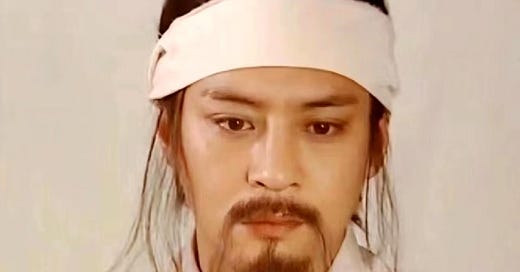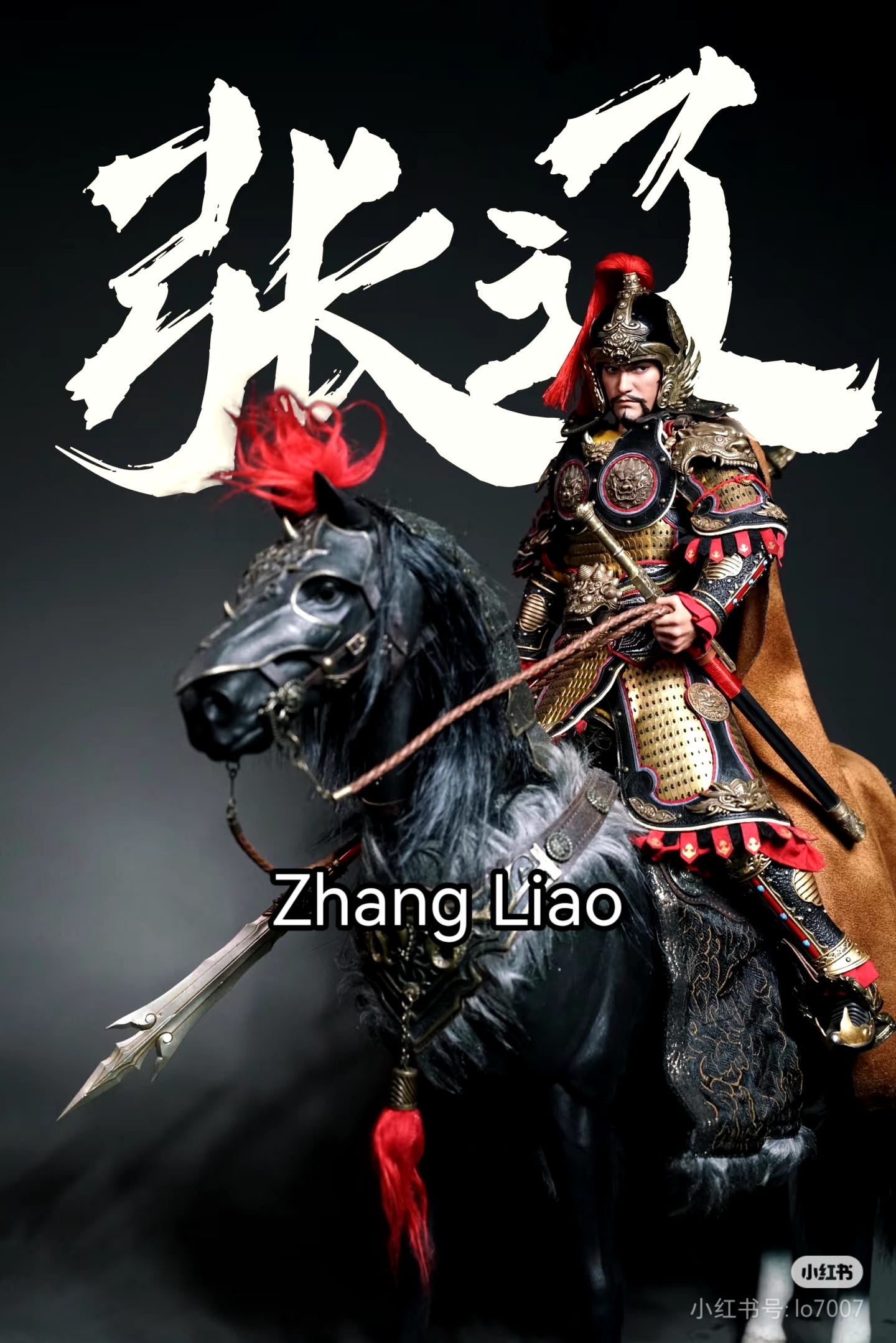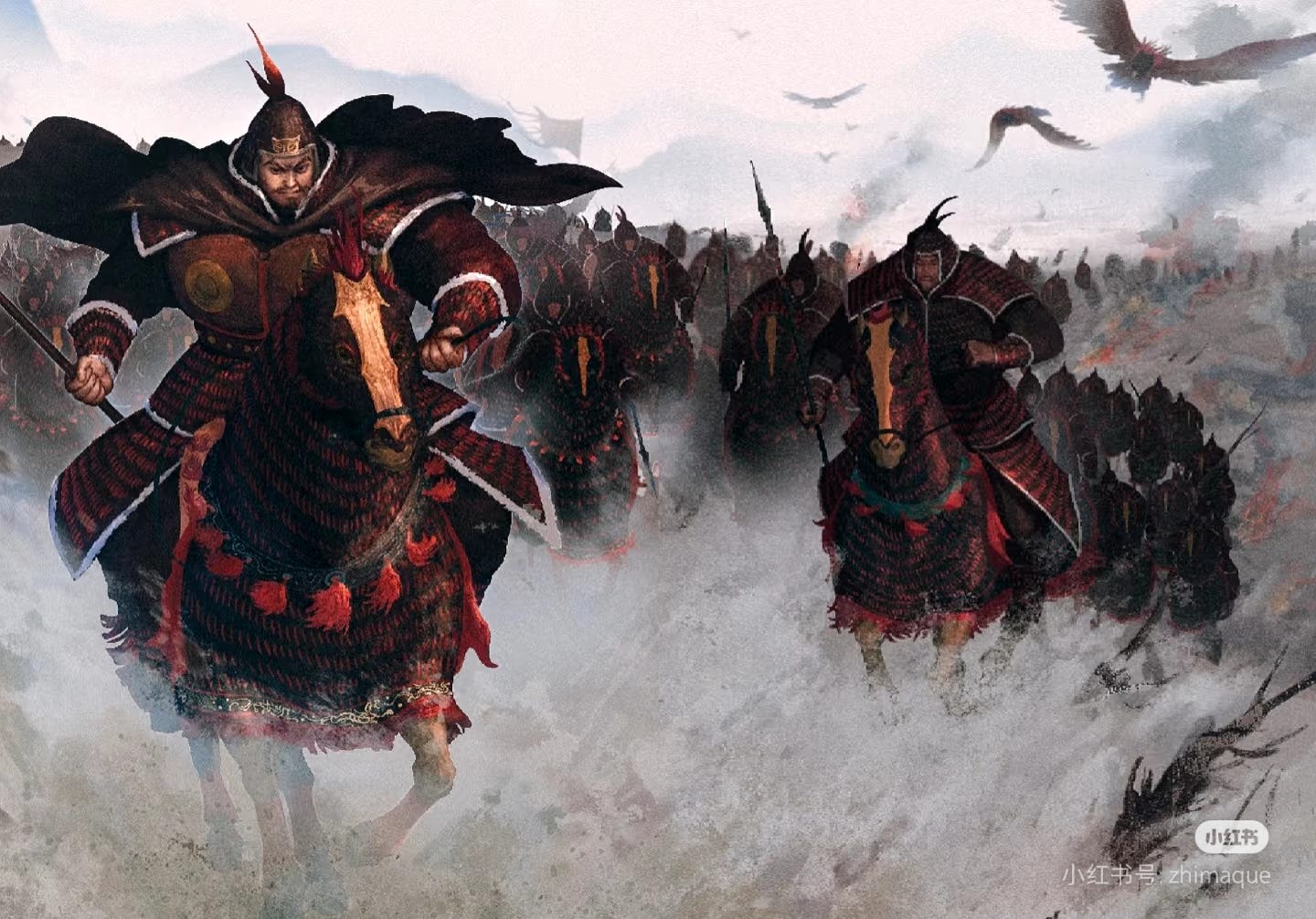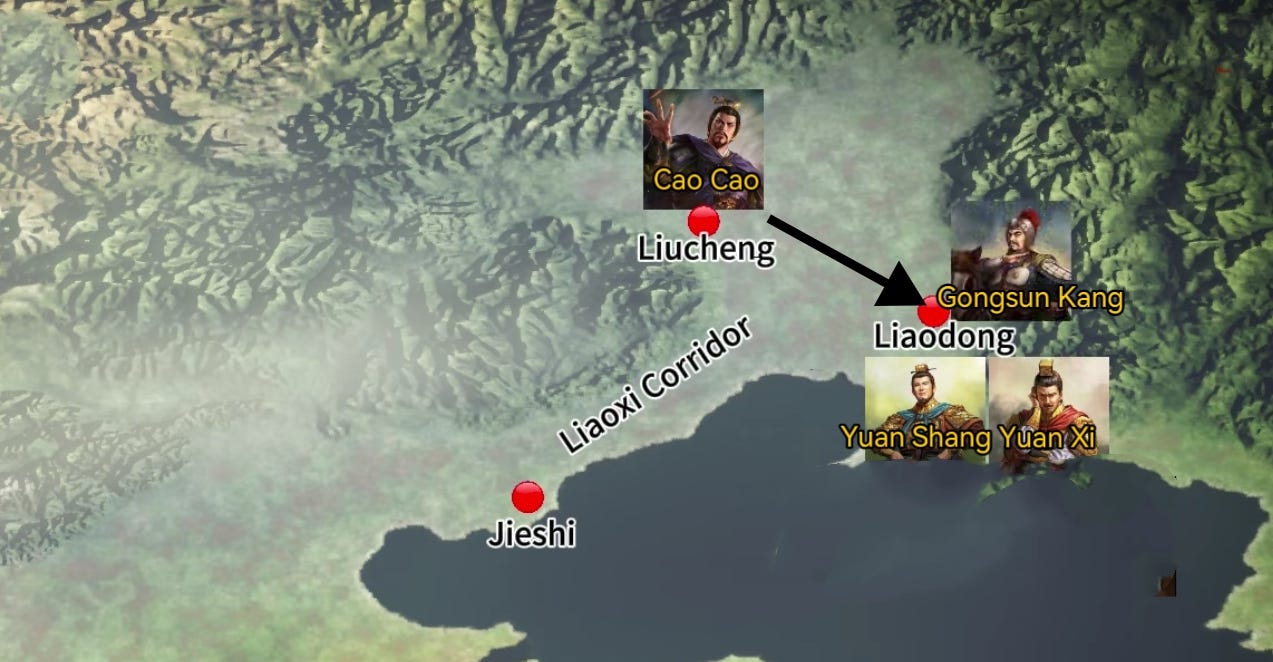Previous Chapter :Cao Cao's Northern Expedition 6(Three Kingdoms 42)
Catalog of Three Kingdoms’ history
When the exhausted Cao’s army arrived at the White Wolf Mountain, tens thousands of mighty WuHuan’s乌桓 cavalry rushed out from their headquarter Liucheng柳城 to engage them, cavalry had the most advantage, so many of Cao Cao's generals were afraid.
In this depressed atmosphere, only Zhang Liao张辽, was courageous enough to persuade Cao Cao to take advantage of the fact that the Wuhuan were not in position yet and fight with them immediately. Cao Cao appreciates Zhang Liao's strong fighting spirit under adversity, so he takes Zhang Liao’s advice and gives Zhang Liao his flag of the commander-in-chief in public, which is equal to temporarily granting Zhang Liao the authority to command the entire army. Zhang Liao immediately held the flag and commanded the Cao’s army to charge into the battlefield, while Cao Chun曹纯, Xu Huang徐晃, Zhang He张郃,Yan Rou闫柔, and Xianyu Fu鲜于辅, all of them fought bravely without the fear of death.
Cao's army and Wuhuan's cavalry fought together in a large-scale bloody battle. The battle was extremely fierce, but Cao's rich combat experience began to come into play. Although Cao's cavalry was fewer in number than Wuhuan's in this battle, the participants were all elites who had followed Cao Cao for many years and had fought in a hundreds of battles throughout the country. Especially in the fierce battle, Tadun踏顿,the King of Wuhuan, is captured by Cao Chun's Tiger Leopard Cavalry, leaving the outcome of this battle no longer in doubt.
With being captured of the commander, the Wuhuan army began to collapse. Cao's army then pursued and captured Liucheng, killing Tadun and 10 Wuhuan leaders, while Yuan Shang袁尚 and Yuan Xi袁熙 fled to Liaodong辽东 with some leaders of Wuhuan. They went east to join Gongsun Kang公孙康, the Commanderial Governor of Liaodong.
At the Late Han period, warlords were fighting each other and there were frequent wars, so many Han Chinese fled to remote areas for refuge, only the people from Jizhou冀州 and Youzhou幽州, who fled to live with Wuhuan, had been more than 100,000 households. Cao Cao ordered all of these exiles from the Han and Wuhuan tribes, totaling several hundred thousand people, to move to the inner regions, and selected the best of the captured Wuhuan cavalry to join Cao Cao's army, creating a cavalry force that was quite capable of fighting. In that chaotic era that Nine out of ten houses were deserted, population was a precious resource even more valuable than territory. Although Cao Cao won the difficult expedition, he undoubtedly gained a huge fortune in the end.
At that time, some people advised Cao Cao to seize the opportunity to pursue and advance into Liaodong, but Cao Cao confidently believed that Gongsun Kang would take the initiative to send the heads of Yuan Shang and Yuan Xi. In September 207 AD, the rainy season had passed, so the Cao’s army returned from the Liaoxi辽西 Corridor. Soon, Gongsun Kang ordered the heads of Yuan Shao, Yuan Xi and those Wuhuan leaders to be sent as a indication of surrender. Everyone was puzzled. Cao Cao said that :"Gongsun Kang had always been afraid of Yuan Shang and Yuan Xi. If I attacked urgently, they would join forces to resist. If we don't attack them, they would kill each other instead,This is forced by the situation!!" Later, Cao Cao appointed Gongsun Kang as the Marquis of Xiangping襄平 and the General of Left.
While passing by Jieshi碣石, Cao Cao climbed the Jieshi Mountain and looked out at the sea with great enthusiasm, writing the famous poem "The Sea":
“I come to view the boundless ocean From Stony Hill on eastern shore.
Its water rolls in rhythmic motion, And islands stand amid its roar.
Tree on tree grows from peak to peak; Grass on grass looks lush far and nigh.
The autumn wind blows drear and bleak; The monstrous billows surge up high.
The sun by day, the moon by night Appear to rise up from the deep.
The Milky Way with stars so bright Sinks down into the sea in sleep.
How happy I feel at this sight! I croon this poem in delight. ”
东临碣石,以观沧海。
水何澹澹,山岛竦峙。
树木丛生,百草丰茂。
秋风萧瑟,洪波涌起。
日月之行,若出其中;
星汉灿烂,若出其里。
幸甚至哉,歌以咏志。
From joining the Anti-Dong Zhuo董卓 Alliance in 190 AD to annihilating Wuhuan in 207 AD, Cao Cao had spent 17 years, through hundreds of uninterrupted battles, finally basically unified northern China.
At the peak of its strength, encountering such a significant blow was devastating for Wuhuan. From then on until the period of Jin Dynasty(265-317AD) and Sixteen Kingdoms(304-439AD), the records of Wuhuan still appeared sporadically in the annals of history. Later, with the assimilation and integration of nations of Han and Xianbei鲜卑 and ofthers, this ancient Nomads gradually disappeared into the long river of history.
For Cao's army, although they won this expedition, the journey was remote and extremely difficult. The climate in Liaoxi area is harsh, and many people are not accustomed to the local conditions, resulting in illness. On the way north, Zhang Xiu张绣, the Marquis of Xuanwei宣威, died of illness in the army. On the way back, Guo Jia郭嘉,Cao Cao’s favourite counsellor, who was 38 years old, also fell ill and passed away.
The relationship between Cao Cao and Guo Jia was very close, the two of them often traveled in the same carriage and sit in the same table. Throughout his years of military career, Cao Cao always carried Guo Jia by his side. More importantly, among the main counsellors around Cao Cao, although Xun Yu荀彧 was several years younger than Cao Cao, he had a heart for the Han Empire more than Cao Cao. Xun You荀攸 and Dong Zhao董昭 are both just a few years behind Cao Cao and belong to the same age group. Jia Xu贾诩 is 8 years older than Cao Cao, while Cheng Yu程昱 is exactly 14 years older than Cao Cao. Only Guo Jia is the youngest, and it can be said that Cao Cao regarded Guo Jia as the core intelligence of the second generation of his regime, so he had high expectations for him.
The death of Guo Jia deeply saddened Cao Cao, and his value will gradually manifest with the passage of time. Until the founding of the Empire of Cao Wei(220-265AD), when the three kingdoms were in tripartite confrontation , Xun Yu, Xun You, and Cheng Yu had passed away one after another, while Jia Xu and others had also grown old. When the brilliant think tank around Cao Cao reached Cao Pi's曹丕 hands, its brilliance had faded away, its talents had withered, and even a terrifying hiatus occurred. If Guo Jia were still alive until Cao Cao passed away, he would only be under 50 years old.
If Guo Jia lived another 20 years, it would be an exaggeration to say that he would help Cao Cao to unify the China. But it is not a problem for Cao's father and son to suffer less losses when facing Liu Bei, Sun Quan, Zhou Yu周瑜, and Zhuge Liang诸葛亮. No wonder Cao Cao, after the defeat of the Red Cliff, cried bitterly and said the famous words:“If Guo Jia is still here, how could I fall to this situation ?”
To be Continued !
Your support is my greatest motivation! I will keep working hard!







